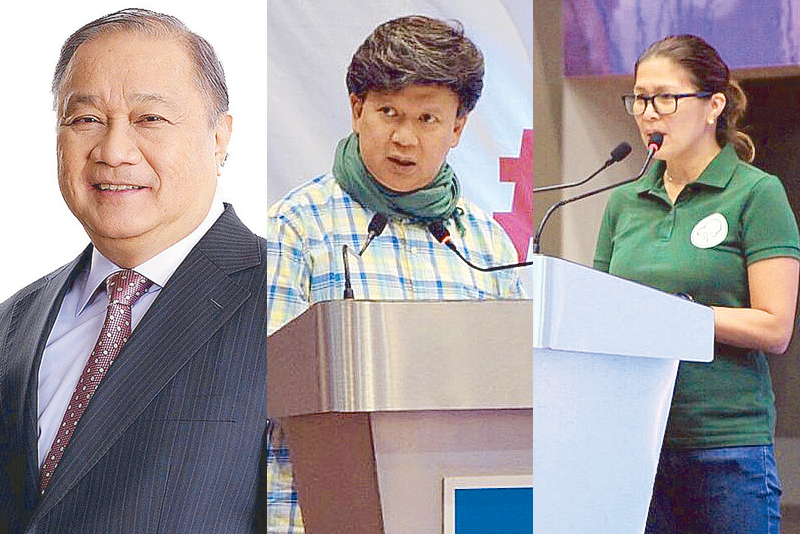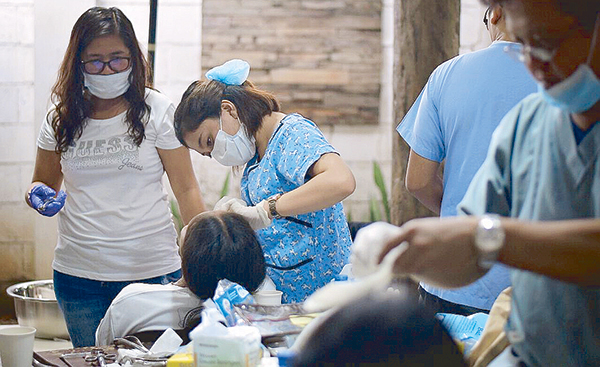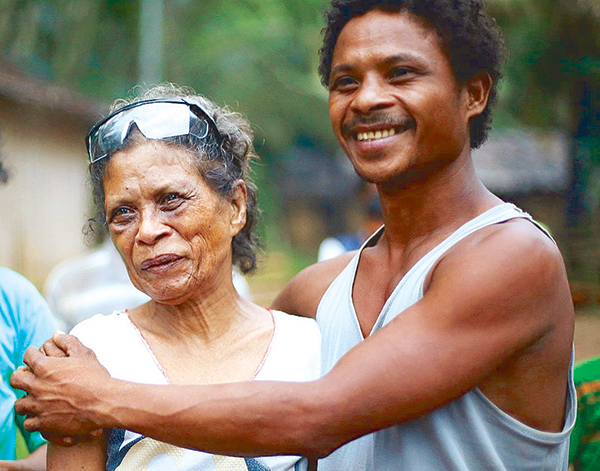#MVPCares in Antipolo City

From left: FPLA chairman Manny V. Pangilinan. FPLA GM and executive director Roy Agustin Evalle. Antipolo Rep. Chiqui Roa-Puno thanks the city’s partners for helping with #MVPCares.
The city of Antipolo had an extended Valentine’s Day gift last February as the First Pacific Leadership Academy (FPLA), chaired by Manny V. Pangilinan, partnered with the Philippine Medical Association of Southern California (PMASC) and the city government of Antipolo for a medical and dental mission dubbed “#MVPCares: Pusong Alay sa Antipolo.”
The project brought 25 doctors, 16 dentists, 14 nurses and more than a hundred volunteers to Antipolo to conduct a medical, surgical and dental mission for 1,800 residents who needed medical and dental care. Among the doctors were members of the PMASC, who flew in all the way from Los Angeles, California just to give back to the community.
“We try to come back as often as we can,” said Dr. Ananias Ebilane, former president of the PMASC. “While we might all be based in the US now, the Philippines is our home; it is our motherland. And there’s so much work left to be done here, so we want to continue coming back to do even more.”
Pangilinan expressed solidarity with the values of Dr. Ebilane.
“Projects like this come from the very core of our group’s value system,” said Pangilinan. “It’s this community, this city, and this nation that make all of our successes possible, and it is only right that we reciprocate their support and their compassion.”
“Health, in particular, is important to every Filipino,” Pangilinan continued. “It’s why most of us Filipinos work hard — to be able to provide adequate healthcare to the people we love. This is why these events are always worth doing for our group.”

Volunteer dentists attend to patients during the #MVPCares medical and dental mission.
Around 1,800 residents of the city visited the FPLA campus for check-ups, fluoride treatments, minor surgeries and medicine, among other services.
Present during the medical mission were Antipolo City Rep. Chiqui Roa-Puno and her husband, former Rep. Robbie Puno. Mayor Jun Ynares also sent board member Dr. Enrico de Guzman as his representative to express his support.
“Giving back is a responsibility,” said FPLA general manager and executive director Roy Agustin Evalle. “The more blessed we are, the more we should share those blessings with our respective communities.
Evalle also thanked FPLA’s “Kapatids” in the MVP Group, who came in full force to support the people of Antipolo, including PLDT, Maynilad Water Services Inc., Cardinal Santos Medical Center, De Los Santos Medical Center, and Makati Medical Center. He also cited significant help from the Amang Rodriguez Memorial Medical Center of Marikina City, a public hospital that offered invaluable assistance for the dental mission.
“We take every opportunity to give back,” says Pangilinan. “In moments of peace and quiet, our group organizes medical and dental missions like this. And in moments of great challenge — or major calamities — we also do our best to make our presence felt. This is our understanding of the term ‘corporate citizen.’ We are citizens of this great nation, and we will always act as such.”
“I have always liked the term ‘medical mission’,” continues Pangilinan. “It indicates a sense of unified purpose. But when we say ‘medical mission,’ I hope we remember that the true mission isn’t providing a few thousand check-ups, or a few hundred minor surgeries. The true mission is to give each and every Filipino a chance to advance, and build a better future for themselves and for this nation. We need to keep working towards that.”
Thus, while the medical mission was a success for FPLA and the rest of the MVP Group, it seems that this will only be one of the early chapters of a heartwarming story that is part of a long tradition of giving back.
An eye-opener for women

Like most women in her village, Nene Calinawan of the Mamanwa tribe, 55, looked forward to farming and looking after her family. Nene went blind 18 months ago, and couldn’t walk or eat by herself. Three months ago, her daughter-in-law heard about The Fred Hallows Foundation’s eye care program, which provides free surgery at Surigao del Norte Provincial Hospital. After surgery on her right eye, Nene said, ‘I can see the beauty outside again!’ Photo courtesy of Mardi Mapa-Suplido
Why do some women turn a blind eye on a hideous partner or a hard life? Could it be because women are 1.3 times more likely to be blind compared to men? Literally blind, that is.
Today is International Women’s Day, a good time to note that at least 55 percent of the world’s blind people are women and most of them live in low- and middle-income countries. Women are also 1.3 times more likely to be blind or vision impaired than men, and four out of five of them don’t need to be blind, as their eye conditions are easily preventable or treatable.
“We know vision impairment and blindness have far-reaching implications, not just for the women affected, but also for their families,” says Mardi Mapa-Suplido, national program manager of The Fred Hollows Foundation in the Philippines, a non-profit aid organization based in Australia and founded in 1992 by eye surgeon Fred Hollows. The foundation trains its sights on treating and preventing blindness and other vision problems in Australia, the Pacific, South and Southeast Asia, and Africa.
According to Gabi Hollows, The Fred Hollows Foundation is launching a new campaign called “She Sees,” which aims to raise $25 million over the next five years to help ensure more women get access to eye health services.
In Tarlac and Surigao, the foundation has facilitated eye health awareness among mothers in communities, supported cataract surgeries, and provided vision screening and the needed eyeglasses to thousands of female students.
The foundation is already pioneering innovative gender projects that are improving eye health for women around the world.
“We know that when The Fred Hollows Foundation restores sight to women and girls, trains female health workers, nurses and doctors, and empowers families, we transform lives,” Mapa-Suplido stresses.
According to “Restoring Women’s Sight,” a report cited by the foundation, women are more likely to be blind because they do not experience the same level of access to eye care as men. Their higher life expectancy means women are also more likely to experience some eye diseases like cataracts. Sadly, treatment costs are prioritized for men because women often lack a stable source of income and have limited decision-making power.
So, don’t be blind to the fact that when it comes to caring for their vision, women have to keep their eyes wide open.
(For more information please e-mail Mardi Mapa-Suplido at [email protected].)
- Latest



























